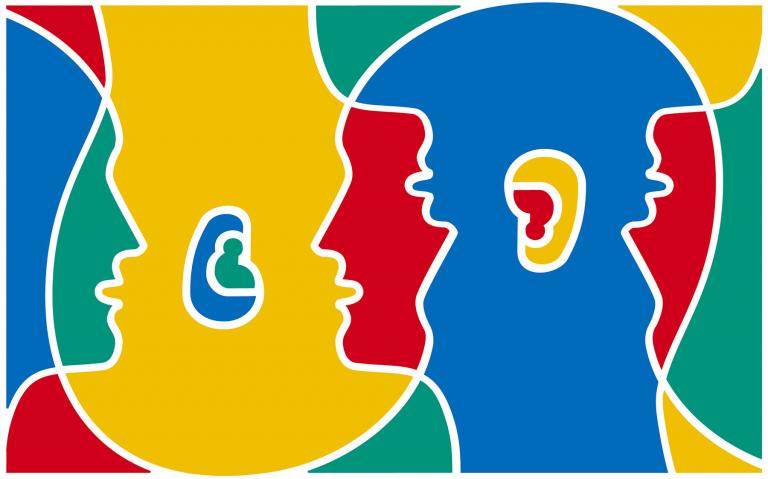A set of resources for the Bi-Co’s offerings in languages and cultures and multilingualism.
The Languages and Cultures Space offers resources and—hopefully, soon—a physical space where the Bi-Co’s languages and cultures and multilingual offerings can hold language tables, write-ins, a multilingual writing hub, film screenings, and tutoring sessions. It promotes connections across these offerings, while challenging the exclusions inherent in a monolingual approach to the world. It is envisioned as a key component of the Interdependence Commons, along with the Center for Peace and Global Citizenship.
Interested in including a link on this website? Contact Ariana Huberman.
Language Learning
To understand transregional and diasporic questions, you need to learn some of the world’s languages. These can be divided into three kinds: Ordinary or customary languages, like Mandarin Chinese or American Sign Language; constructed languages, like Esperanto or the technical languages of professions and academic disciplines like Kallawaya herbalism and Sociology; and formal languages, like those created in formal logic, mathematics, and computer programming. Students at Haverford are required to study all three kinds of languages. This makes sense, because to appreciate the world’s diversities, it helps to understand its basic kinds of languages.
Haverford and the Tri-Co offer considerable resources for learning all three kinds of languages. And that’s a good thing, because we have an incredible amount of linguistic diversity right here! Did you know that some 50 languages are spoken in the Bi-Co alone?
Instruction in Ordinary Languages
To make transregional connections, it helps to know two or more of the world’s ordinary or customary languages, like Sanskrit or Japanese. So we are fortunate that Haverford and the Tri-Co offer regular instruction in some 15 ordinary languages, both modern and classical, which are listed here. In addition, the Tri-Co Linguistics Department offers occasional instruction in less-commonly-taught languages, like Zapotec, Navajo, Wamesa, Kyrgyz, and others. All these programs offer instruction and language-learning resources to students, faculty, and staff. The Bi-College Program in Comparative Literature also encourages language learning and the exploration of diverse literary cultures. Check out the links below to learn more about these programs and how you can engage their resources.
Centers and Resource Programs for Learning Languages and Cultures
Besides programs of instruction in languages—ordinary, constructed, and formal—Haverford and the Tri-Co Consortium also offer many centers and resource programs aimed at helping students learn all three kinds of languages. Check out the links below to the resources you and your students can use to strengthen the language skills needed to understand our diverse, transnational world.
- Bi-Co French Film Series
- Bi-Co German Film Series
- CREA at Haverford Spanish
- Language and Media Centers at Swarthmore
- Language Tables at Swarthmore
- Language Teaching Assistant Workshop at Bryn Mawr
- Math Question Center at Haverford
- Q Project at Bryn Mawr
- Russian Language Flagship at Bryn Mawr
- Social Sciences Quantitative Laboratory at Swarthmore
- Writing Center at Bryn Mawr
- Writing Center at Haverford
The Bi-Co’s Languages and Cultures
Faculty who would like to highlight recent work on languages/cultures, or would like to showcase your students’ work, please contact Ariana Huberman.
Studying Languages Off-campus
- For information on language-focused study abroad, check out the list of programs under "Fulfills Language Requirement."
- CPGC Partnerships with Organizations Abroad/Multilingual Organizations
- Interested in resources for students for summer study of language or language exchanges? Check out the resources page of Bi-Co Japanese.
Conferences, Workshops, Colloquia
- Looking for languages/cultures colloquia? Check out Bryn Mawr's Classics colloquium.
- For advising students on languages/cultures student conferences in the region Among others, look at the Greater Philadelphia Asian Studies Consortium and the Greater Philadelphia Latin American Studies Consortium.
Faculty Exchange Opportunities
- The HaverBlog wrote about our Fulbright Language Teaching Assistants model. Contact Ariana Huberman in the Spanish Department to learn more.
- For information on how to hire a Language Visiting Scholar, visit the Fulbright Program site, and speak to the Provost’s Grants and Research team.
